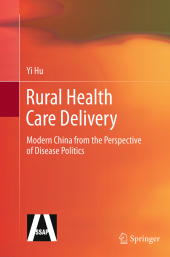 Neuerscheinungen 2016Stand: 2020-02-01 |
Schnellsuche
ISBN/Stichwort/Autor
|
Herderstraße 10
10625 Berlin
Tel.: 030 315 714 16
Fax 030 315 714 14
info@buchspektrum.de |

Yi Hu
Rural Health Care Delivery
Modern China from the Perspective of Disease Politics
Softcover reprint of the original 1st ed. 2013. 2016. xiii, 254 S. 2 SW-Abb., 4 Tabellen. 235 mm
Verlag/Jahr: SPRINGER, BERLIN; SPRINGER BERLIN HEIDELBERG 2016
ISBN: 3-662-51307-2 (3662513072)
Neue ISBN: 978-3-662-51307-1 (9783662513071)
Preis und Lieferzeit: Bitte klicken
This painstaking investigation into the evolution of disease politics in China analyzes the repeated changes in healthcare provision in rural areas to provide revealing insights into the political processes that built the modern-day People´s Republic.
Diseases are everyday, ordinary occurrences intimately related to people´s daily lives. However, as the metaphor of the "Sick Man of East Asia" emerged against the backdrop of a weak modern China, health care and the curing of diseases were turned into grand state politics with far-reaching implications. This book, starting with the argument for diseases being metaphors, describes and interprets such incidents in China´s history as the Abolishment of Traditional Chinese Medicine, the Patriotic Hygiene Campaign and the Cooperative Medical Services. In an effort to reveal the internal logic of disease politics in the transformation of the state-people relationship, the book analyzes key aspects including the politicization and inclusion of diseases in state governance, the double disciplining of hygiene, legitimacy construction of the state, the remaking of the nationals, and the expansion of the "publicness" of the state. The book argues that disease politics in modern China has developed following the path from nationals to the people, and then to citizens, or from crisis politics and mobilization politics to life politics. In addition, a marked change has occurred in China´s state building: increasingly standard, rationalized and institutionalized means have been employed while the non-standard means, such as large-scale mobilization and ideological coercion, had been historically used in China.
Part I: Introduction.- The Double Meaning of the "Sick Man of East Asia" and China´s Politics.- Presentation, Discourse, and Absence.- Rural Health Care Delivery and State Building.- The Structure and the Content of this Book.- Part II: The Emerging Concept of Hygiene and Medicine from the State Perspective.- National Defense and Hygiene.- Abolishment of Traditional Chinese Medicine.- Rural Medical Care Delivery: The Experiment and Follow-up in Ding Country.- Part III: The People´s Medical Care: A Brand New State and the Guideline for Health Care.- State of "the People".- Guidelines for Health Care Services.- Part IV: The Political Aspect of Hygiene: The Patriotic Hygiene Campaign.- Building a New and Clean State.- The Patriotic Hygiene Campaign and the Construction of Clean New People.- A Farewell to the "Sick Man of East Asia": The Irony, Deconstruction, and Reshaping of the Metaphor.- Part V: "China´s Road": The Cooperative Medical Services.- "To Put the Emphasis of Medical Care on the Countryside".- Mobile Medical Services.- Cooperative Medical Services in Rural Areas.- Chapter Four: "China´s Road": The Cooperative Medical Services as a "Paradigm".- Part VI: A Public Country: The New Cooperative Medical Services.- A Risk Society.- New Cooperative Medical Service.- A Public Country and Its Expansion.- Conclusion: Disease Politics: A Nation-state or a Democratic State?.- The Logic of Disease Politics.- Curse to the Latecomer.- Local Knowledge and Localized Knowledge.- A Nation State? A Democratic State?.- References.- Postscript.


